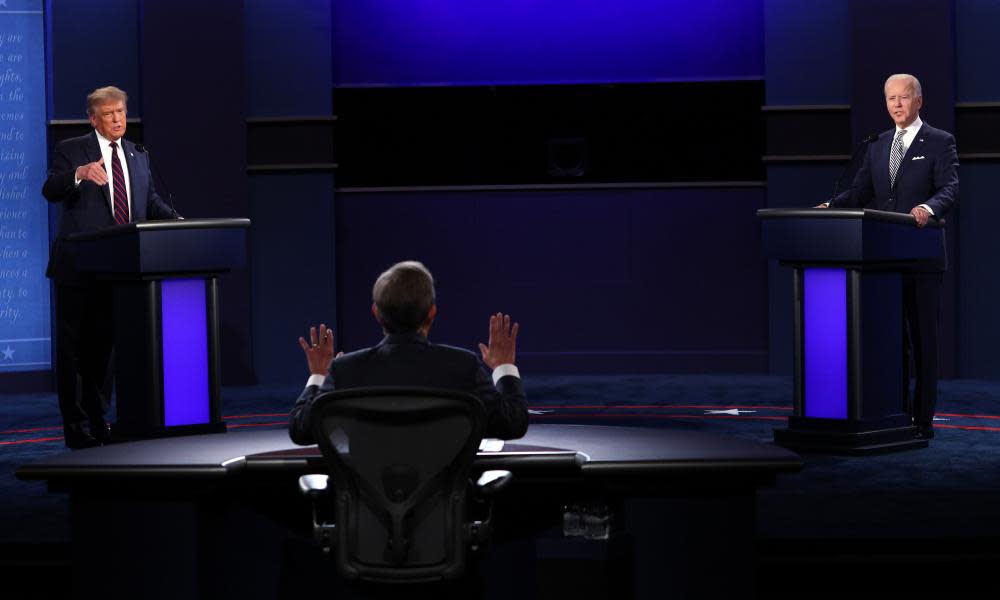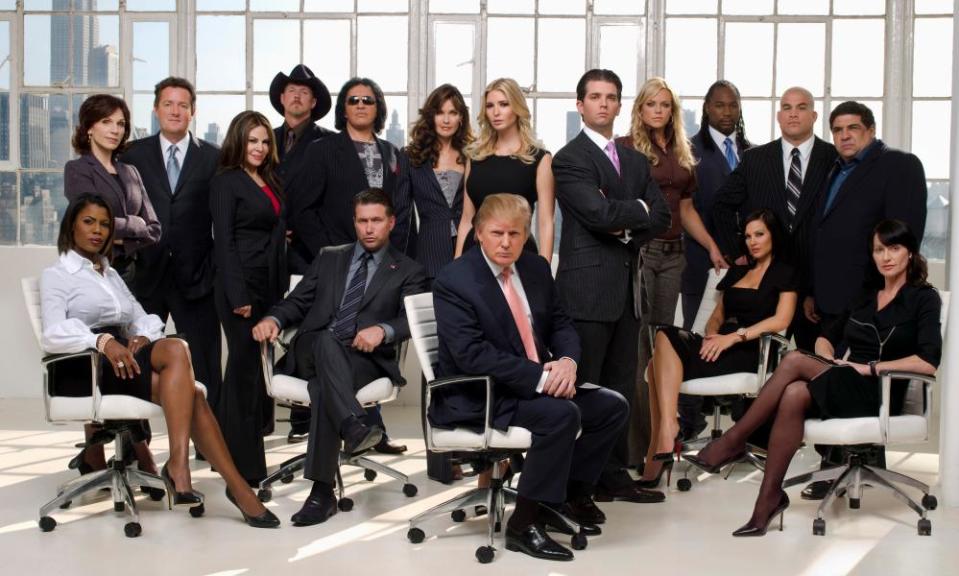First Thing: 'This is so unpresidential,' Biden tells Trump

Good morning.
It was, by most accounts, the worst televised presidential debate in US history – and there are two more of them to come. Donald Trump repeatedly interrupted and insulted Joe Biden on stage in Cleveland on Tuesday, giving his Democratic rival little opportunity to make sustained arguments, and leaving debate moderator Chris Wallace struggling to control the ugly spectacle. At one point, Biden simply sighed: “Will you shut up, man? This is so unpresidential.”
Only one of the two men on stage looked remotely presidential, writes Daniel Strauss, “and it was not the incumbent.” Trump repeatedly made personal attacks on Biden’s son, Hunter. Given the opportunity to condemn white supremacists, the president instead name-checked the far-right Proud Boys group – telling them to “stand back and stand by” – and then blamed the recent partisan violence in US cities exclusively on the left.
For the Guardian’s panel of experts, the debate was a brawl with no winners, least of all the American people. At a watch party in southern California, Lois Beckett found a crowd whose support for Trump seemed unshakeable. But as Richard Wolffe writes, it is undecided voters that the president needs to win over, and they are unlikely to have been impressed by his performance:
As a debating tactic, Trump’s choice of endless chatter succeeded in dominating the conversation. As a pitch for the sliver of undecided voters left in America, it was a charmless barrage of hostility and hubris.
Trump’s Apprentice earnings rescued a failing empire

Trump played the part of a successful businessman on The Apprentice, but as the New York Times’ bombshell report on the president’s tax returns proves, when he was first hired for the show by NBC, Trump was anything but successful. Instead, the $427m he eventually earned from The Apprentice helped to shore up his vast losses from real estate and casinos.
Workers around the country were outraged to learn that Trump paid less than them in federal income tax, and in fact paid none at all for 10 of the last 15 years, as Michael Sainato reports.
Florida’s ‘mini-Trump’ is cracking down on non-existent violence
The Republican governor of Florida, Ron DeSantis, has announced plans to impose tougher penalties on protesters, even though his state avoided the sort of disorder that overtook some US cities this summer. His critics say the move is pure “mini-Trump”: an effort to distract from his manifest failures over the coronavirus pandemic.
The Guardian’s southern US bureau chief, Oliver Laughland, traveled to Florida for the first in our new series of Anywhere but Washington reports, and found sunshine state voters living in two different realities: one adherent to facts and science, the other rooted in conspiracies and political dogma.
Are big tech firms handing Hong Kong user data to China?
A top official at the US state department has told the Guardian that big technology companies might already be complying with a new Chinese law imposed on Hong Kong, which would oblige them to share with Beijing information on their users in the supposedly semi-autonomous territory. Those tech firms, including Facebook, Google and Microsoft, ought to “come clean” about the vulnerability of such data, the official said.
Hong Kong has become mired in a recession that had already begun when the Covid-19 pandemic hit, after six months of protests over China’s new security law.
HSBC has been caught in the geopolitical battle over Hong Kong. Once considered a financial bridge between Asia and the west, reports Kalyeena Makortoff, the bank now faces pressure to pick a side.
In other news…

Walt Disney is laying off 28,000 theme park workers, the company announced on Tuesday, blaming the “difficult decision” on lack of attendance at its parks around the world during the coronavirus pandemic.
The World Bank has announced a $12bn vaccine initiative to allow poor countries to purchase Covid-19 vaccines for up to 2 billion people as soon as effective drugs become available.
Two in five of the world’s plant species are at risk of extinction as a result of the destruction of the natural world, according to a report led by the UK’s Royal Botanical Gardens at Kew.
Great reads

America’s year of fire and tempests
In a year already tumultuous for other reasons, the US has been hit by record-breaking wildfires in the west, while in the Atlantic there were briefly five large storms spinning at once. Climate change is bringing big shifts, writes Oliver Milman, that will ultimately upend Americans’ lives like no other threat.
Can a friendship still bridge the political divide?
Glenn Stanton is an evangelical activist and committed opponent of gay marriage. Sheila Kloefkorn fought for equal marriage for years, and married her wife the day it became legal in Arizona. Yet thanks to an organisation that encourages understanding across the US political divide, they have become friends, as they tell Poppy Noor.
How egg freezing got rebranded as self-care
Egg freezing was first developed for women with serious medical conditions, who might want a baby later in life. Today, fertility startups sell the procedure as an option for the everyday, liberated younger woman. But some doctors are pushing back, saying it offers false hope and plays on women’s fears. Rebecca Grant reports.
Opinion: women are the hardest hit by the coronavirus
More men than women die directly from Covid-19, but around the world the socioeconomic impacts of the pandemic are reinforcing traditional power imbalances – and hitting women hardest, argues Helen Pankhurst.
Just like every emergency, every disaster, Covid-19 absolutely does discriminate. It’s ageist, it’s racist, it’s classist and it’s worst of all for those with pre-existing health conditions or disabilities.
Last Thing: England’s jetpack paramedics
They were once the archetypal device of the future. But for several decades, jetpacks have failed to find a practical application. Perhaps they won’t have to wait much longer: after an impressive demo flight, paramedics powered by lightweight jet-suits could be rescuing injured hikers in England’s Lake District as soon as next summer.
Sign up
First Thing is delivered to thousands of inboxes every weekday. If you’re not already signed up, subscribe now.


